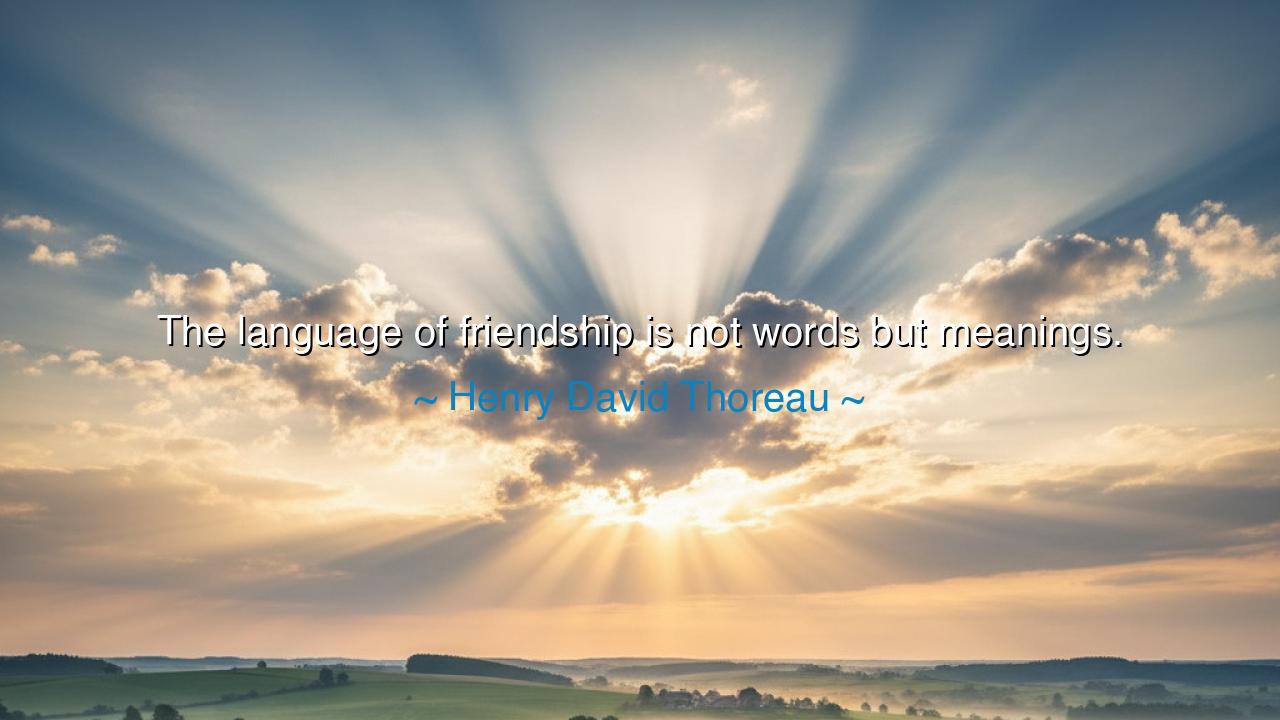
The language of friendship is not words but meanings.






Henry David Thoreau, the poet of solitude and seeker of truth, once wrote with gentle power: “The language of friendship is not words but meanings.” In these few, radiant words, he captures a truth so delicate and eternal that it speaks beyond the boundaries of speech itself. For friendship, in its purest form, is not bound by conversation or letters, but by understanding — that deep communion of souls where silence itself becomes eloquent. Thoreau, who lived close to nature and closer still to his own heart, saw that friendship, like the wind through the pines, is felt rather than heard. Words may falter or fade, but meanings — the shared feeling beneath them — endure across time and distance.
The origin of this wisdom lies in Thoreau’s reflections at Walden Pond, where he withdrew from the noise of the world to rediscover life’s essence. In his solitude, he pondered the nature of human connection — how people speak endlessly, yet so rarely understand one another. He came to believe that true friendship does not depend upon constant speech, but upon silent comprehension. The language of friendship, he wrote, is woven not of syllables but of spirit — of gestures, glances, and quiet acts of loyalty. When two souls are attuned, a single word may convey volumes, and even silence becomes full of meaning. It is the communion of minds that needs no translation, the unspoken harmony that binds friend to friend as surely as gravity binds the stars.
To say that friendship speaks through meanings rather than words is to say that it transcends the surface of communication. The chatter of the tongue belongs to the world of habit; but the understanding of a true friend touches something eternal. When one suffers, the friend does not need to ask what is wrong — he feels it in his own heart. When one rejoices, the friend’s joy rises like an echo. Between such souls, language becomes almost unnecessary. The words may cease, but the bond continues to speak in a thousand silent ways: in a shared glance, a remembered gesture, or the simple presence that says, “You are not alone.”
History gives us a living image of Thoreau’s truth in his own friendship with Ralph Waldo Emerson. Their bond was not one of endless conversation, but of mutual insight — each inspiring the other’s thought, each understanding what the other left unspoken. When Thoreau was jailed for refusing to pay a tax that supported slavery, Emerson came to visit him. “Henry,” he said, “why are you here?” Thoreau looked calmly back and asked, “Why are you not here?” In that brief exchange, no anger was spoken, no argument was needed — yet the meaning was clear: the gulf between conscience and comfort, between the thinker and the bystander. Their friendship was not in the words, but in the shared moral clarity that defined both men.
Thoreau’s wisdom reminds us that the heart speaks a language beyond speech. In a world crowded with words, it is easy to confuse talk for connection. But the truest friendships do not demand constant expression — they dwell in trust. One can walk beside a friend in silence and feel more understood than in a thousand conversations. Such friendships endure distance, survive misunderstanding, and transcend time. For where meanings are shared, words are unnecessary; but where meanings differ, no number of words can bridge the divide.
This teaching also carries a quiet challenge. To live by the language of meanings, one must learn to listen — not merely with the ear, but with the soul. It is easy to speak; it is harder to understand. Many hear the words of their friends but miss the truths behind them. The wise, however, learn to discern what is unspoken — the trembling beneath laughter, the weariness behind a smile, the love hidden in reproach. To be a true friend, therefore, is not to speak much, but to perceive deeply. To understand the heart without demand, to offer presence without judgment — this is to speak in the language that Thoreau revered.
So, my children of insight and remembrance, let this be your lesson: cultivate the friendship that speaks in meanings, not merely in words. Do not measure your bonds by how often you speak, but by how deeply you understand. Be the friend who can sit in silence and still say, “I am here.” Speak less, but mean more. Listen not for the sound of words, but for the pulse of the heart beneath them. For in this quiet, sacred language — the language of understanding — the human spirit finds its truest voice.
And remember, as Thoreau himself would teach, that when friendship lives in meaning, it can never be broken. Words may be forgotten, voices may fade, but the understanding of the soul endures. Such friendship is eternal — a communion not of the tongue, but of the heart; not of conversation, but of connection. It is the stillness between words that speaks most truly — and it is there, in that silent harmony, that the language of friendship is most beautifully heard.






AAdministratorAdministrator
Welcome, honored guests. Please leave a comment, we will respond soon